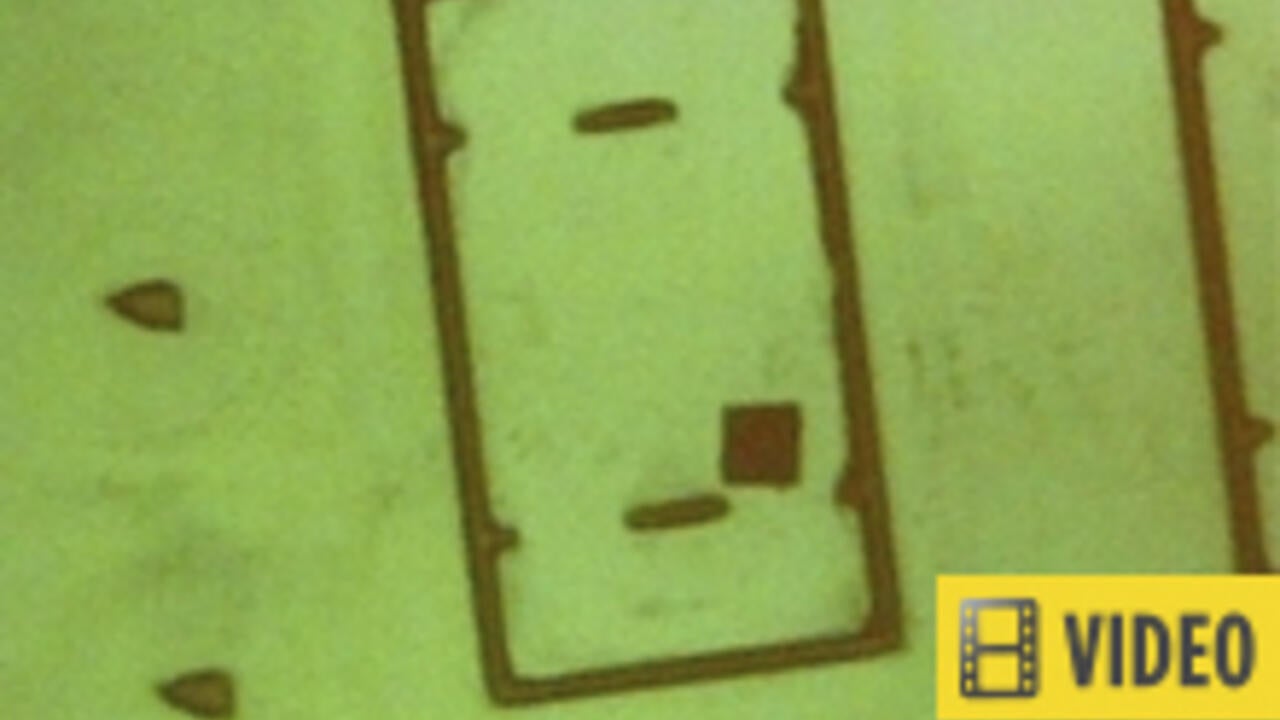
How fast is Waterloo’s microrobot?
Big international win in Germany for tiny robot designed by Waterloo nanorobotics group.

Big international win in Germany for tiny robot designed by Waterloo nanorobotics group.
By Staff Communications and Public AffairsIt’s a small venue for an event. Really small. Just 3.5 millimetres by 2 millimetres. And don’t blink at the annual Mobile Microrobotics Challenge in Karlsruhe, Germany. University of Waterloo’s team won the race in .33 seconds.
The event, which took place at the International Conference on Robotics and Automation last week, was a tight race. The next closest contender was Carnegie Mellon University. That team’s microrobot navigated the tiny figure-eight track in .35 seconds.
"When you have something that small, if you are a few milliseconds too slow when controlling the robot, it could end up off the course at a distance 100 times its size," said Matthew Maclean, a third-year student in software engineering, who was the “driver” for the Waterloo team. "We do lose the robots from time to time when testing because it's like trying to find a speck of dust."
Waterloo undergrads defeat graduate teams
The team defeated six other teams made up of graduate and post-doctoral students from top international universities. This is the second time a Waterloo team, which works out of the University of Waterloo Nanorobotics Group (UW_NRG), has won the event. The winning team was made up of 45 undergraduate students from engineering, math and arts.
Feridun Hamdullahpur, president and vice-chancellor of Waterloo, said the victory highlights the collaborative spirit and multidisciplinary approach taken at Waterloo. “They surpassed graduate students and postdoctoral candidates from other top universities, which is indicative of their work ethic and high skill. I congratulate them on their victory," he said.

University of Waterloo's Microrobotics team in Germany.
Speed and agility
In order to see the race, organizers placed a microscope over the tiny arena and projected the race onto a large screen for spectators. The successful team had to successfully navigate around the figure-eight track in the shortest amount of time.
The team used "advanced micro-scale technology" to control the speed and agility of its competitive microrobot "with unmatched precision," finishing three runs with a final average time of .33 seconds.
Medical applications
The implications of this performance can lead to progressive leaps in the development of micro-scale applications from targeted drug delivery and minimally invasive surgery to advanced electronics manufacturing.
"UW_NRG will always be truly grateful for the supportive community and network of organizations at the University of Waterloo that provided the group with the resources it needed to innovate and succeed," a statement from the team said.

Read more
Meet five exceptional Waterloo graduate students crossing the convocation stage as Class of 2025 valedictorians

Read more
Twenty-six researchers receive federal funding to drive discovery, innovation and research infrastructure development

Read more
The Royal Society of Canada welcomes five new fellows and one RSC College member from the University of Waterloo
The University of Waterloo acknowledges that much of our work takes place on the traditional territory of the Neutral, Anishinaabeg, and Haudenosaunee peoples. Our main campus is situated on the Haldimand Tract, the land granted to the Six Nations that includes six miles on each side of the Grand River. Our active work toward reconciliation takes place across our campuses through research, learning, teaching, and community building, and is co-ordinated within the Office of Indigenous Relations.